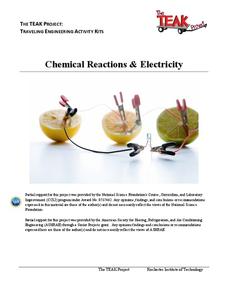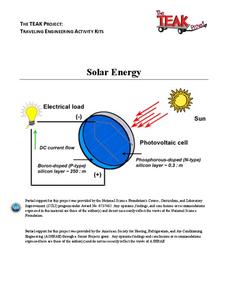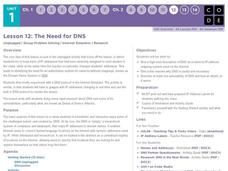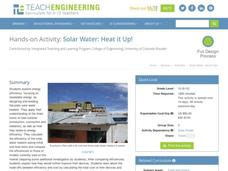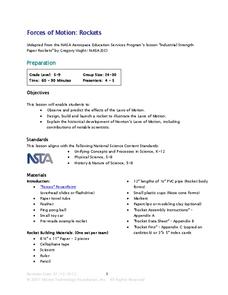DiscoverE
Design a Shoe
Engage young scientists in a project where high fashion meets engineering! Using foam core and hot glue, partnered pupils design and create a functional, fashionable pair of shoes. Groups then put the footwear through its paces using a...
DiscoverE
Slender Tower Challenge
Looking for an engineering project that will tower above the rest? Try a design experiment that has built-in fun! Groups examine a variety of skyscraper designs, then compete to create their own slender towers. The teacher's guide is...
DiscoverE
LIDAR: Mapping with Lasers
We would be lost without maps! How are they made? Introduce junior topographers to LIDAR technology with a fascinating activity. Set up a mock city, then have learners operate a laser measure to determine the shape of the landscape using...
Harvard University
Creative Computing
Scratch the surface of computer coding. A seven-unit lesson guide provides a crash course on computer programming. It uses a programming language called Scratch.
Code.org
Star Wars: Building a Galaxy with Code
Welcome to the code side. The interactive lesson introduces coding in a game format with familiar characters. Young computer experts learn to develop code to control the interaction of the characters in the game. The activity ends with...
Rochester Institute of Technology
Chemical Reactions and Electricity
After a discussion of chemical reactions and electricity, scholars break into groups and follow a scripted activity to discover if fruit can power a clock. After a concluding discussion, the class a presented with a challenge.
Rochester Institute of Technology
Solar Energy
Warm up to the idea of solar energy. A lesson includes three activities that challenge scholars to apply knowledge in new ways. First, they learn to run an alarm clock without a battery by using solar energy. Next, they complete an...
Rochester Institute of Technology
Biomechanical Joint
Discuss mechanical advantage and how the human body moves/works. Learners focus on bioengineering, working together to build a functioning mechanical arm. Additionally, they analyze an air muscle, discussing its appropriate use in humans.
Rochester Institute of Technology
Molecules and Fuel Cell Technology
A fuel cell is where the jailer keeps gas guzzlers. Scholars review chemical reactions, chemical bonds, and chemical structure in order to apply these concepts. Participants construct fuel cell kits, using electrolysis to run the car and...
Teach Engineering
Communicating Your Results
Groups analyze and interpret their data from previous research in order to develop individualized findings. The teams then use guidelines to help determine what aspects of their research to include on a poster. Class members then compare...
Teach Engineering
Introduction to Environmental Engineering
A series on environmental engineering introduces the class to issues that environmental engineers work to solve. This first lesson focuses on air and land issues, and looks at ways to reduce pollution.
Teach Engineering
Introduction to Water Chemistry
What are the issues surrounding water quality? Viewers of this short presentation gain information about the importance of clean water, the lack of fresh water, water contamination, and ways that engineers treat water.
Code.org
The Need for DNS
That's one complicated address book! To understand the need for a system that keeps track of addresses, pupils trying to find the IP address of their classmates. Then individuals change their IP addresses, which leads to research about...
Code.org
Encoding Color Images
Color me green. The fourth lesson in a unit of 15 introduces the class to color images and how to encode color images using binary code and hexadecimal numbers — and they will quickly notice that it is easier to code the color for each...
Code.org
Sending Binary Messages
Pairs build a device that will be able to send a binary message. They then update their device to allow it to send four possible messages before upping the ante to eight. The provided self-assessment rubric comes with reflection...
Teach Engineering
Design Step 6: Evaluate/Manufacture a Final Product
This is what all of the excitement has been building up to! Young engineers create engineering drawings, use machines to manufacture their products, test, and evaluate their designs in the last step in the engineering design process.
Teach Engineering
Design Step 5: Construct a Prototype
Enough with the talking, let's build something! In the fifth step in the engineering design process, young engineers build a prototype to test their ideas. The instructional activity walks them through the process of evaluating it...
Teach Engineering
Solar Water: Heat it Up!
Young engineers are instructed to design and build their own solar water heaters. Then, they calculate the efficiency and cost and compare them to commercially available models. This is a full unit for pupils to apply their knowledge.
Curated OER
Construction of a Microscale Fuel Cell
Fuel cells are being called the "energy source" of the future. Allow your high school chemistry class to construct a miscroscale fuel cell, complete with all components to generate energy. This engaging activity will allow them to apply...
Micron Technology Foundation
Forces of Motion: Rockets
Young scientists design a rocket to launch using Newton's Laws of Motion in order to discover for themselves the forces of motion.
Institute of Electrical and Electronics Engineers
Dispenser Designs
After reading about the history of tape dispensers, learners compare and contrast different dispenser designs. Next, teams work within budgetary and time constraints to design a better dispenser. When finished, each engineer reflects on...
Texas State Energy Conservation Office
Investigation: Acceleration
Take a look at acceleration within the context of automotive technology. They vary the mass on a toy car and run it down a ramp, exploring Newton's second law of motion. Though this is a classic lab activity, you will appreciate the...
Texas State Energy Conservation Office
Investigation: Crank It Up!
Following this procedure, eager engineers construct a working model of a piston system, similar to that in an internal combustion engine. Perfect for STEM or automotive technology classes, the activity comes complete with analysis and...
Institute of Electrical and Electronics Engineers
Popsicle Bridge
Using popsicle sticks and glue, groups must work together to design and build a bridge that can support weight and is aesthetically pleasing. The instructional activity begins by learners reading about different features of bridge...







